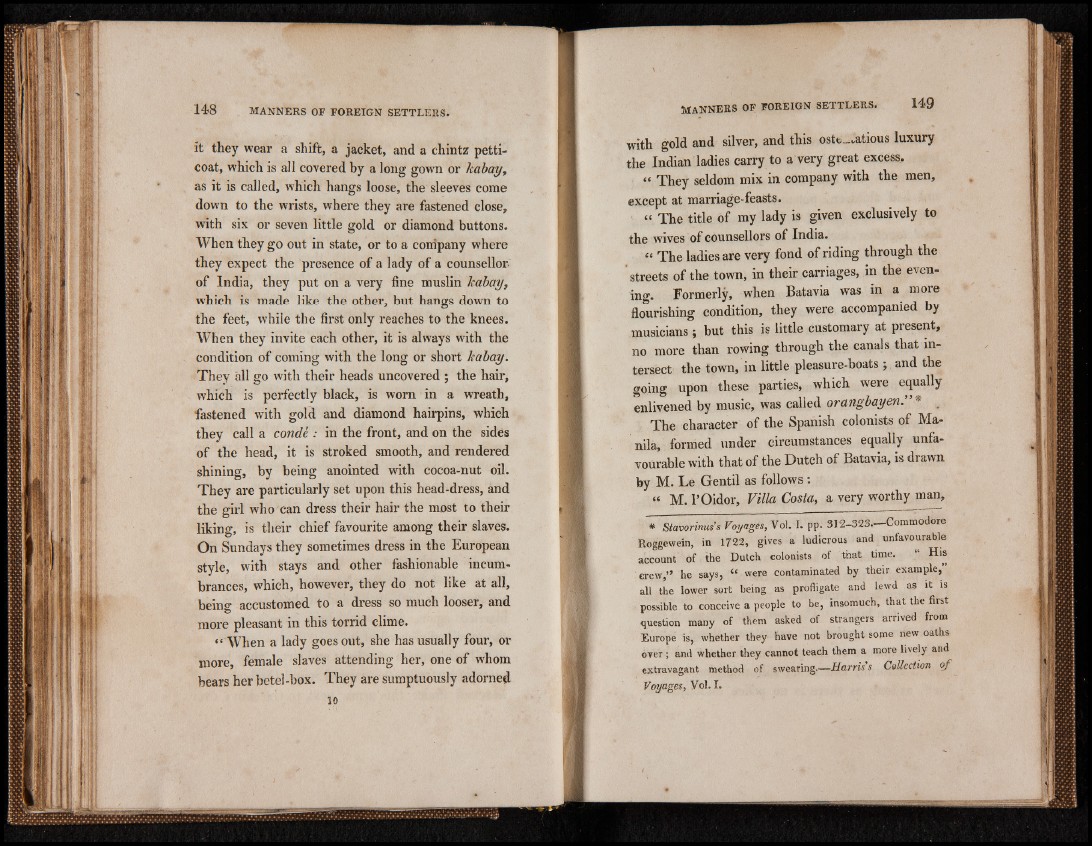
it they wear a shift, a jacket, and a chintz petticoat,
which is all covered by a long gown or kabay,
as it is called, which hangs loose, the sleeves come
down to the wrists, where they are fastened close,
with six or seven little gold or diamond buttons.
When they go out in state, or to a conipany where
they expect the presence of a lady of a counsellor
of India, they put on a very fine muslin kabay,
which is made like the other, but hangs down to
the feet, while the first only reaches to the knees.
When they invite each other, it is always with the
condition of coming with the long or short kabay.
They all go with their heads uncovered ; the hair,
which is perfectly black, is worn in a wreath,
fastened with gold and diamond hairpins, which
they call a conde : in the front, and on the sides
of the head, it is stroked smooth, and rendered
shining, by being anointed with cocoa-nut oil.
They are particularly set upon this head-dress, and
the girl who can dress their hair the most to their
liking, is their chief favourite among their slaves.
On Sundays they sometimes dress in the European
style, with stays and other fashionable incumbrances,
which, however, they do not like at all,
being- accustomed to O a dress so much looser, and
more pleasant in this torrid clime.
“ When a lady goes out, she has usually four, or
more, female slaves attending her, one of whom
bears her betel-box. They are sumptuously adorned
10
with gold and silver, and this oste_.atious luxury
the Indian ladies carry to a very great excess,
“ They seldom mix in company with the men,
except at marriage-feasts.
ft The title of my lady is given exclusively to
the wives of counsellors of India.
“ The ladies are very fond of riding through the
"streets of the town, in their carriages, in the evening.
Formerly, when Batavia was in a more
flourishing condition, they were accompanied by
musicians ; but this is little customary at present,
no more than rowing through the canals that intersect
the town, in little pleasure-boats ; and the
going upon these parties, which were equally
enlivened by music, was called orangbayen. * .
The character of the Spanish colonists of Manila,
formed under circumstances equally unfavourable
with that of the Dutch of Batavia, is drawn
by M. Le Gentil as follows :
I M. l’Oidor, Villa Costa, a very worthy man,
* Stavorinus's Voyages, Vol. I. pp. 312- 323.-Commodore
Roggewein, in 1722, gives a ludicrous and unfavourable
account of the Dutch colonists of that time. “ His
crew,’* he says, “ were contaminated by their example,
all the lower sort being as profligate and lewd as it is
possible to conceive a people to be, insomuch, that the first
question many of them asked of strangers arrived from
Europe is, whether they have not brought some new oaths
over; and whether they cannot teach them a more lively and
extravagant method of swearing.— Harris s Collection o f
Voyages, Vol. I.